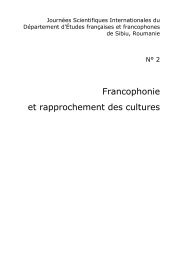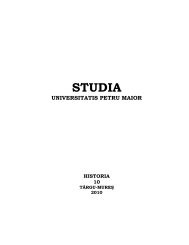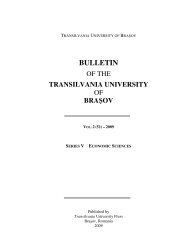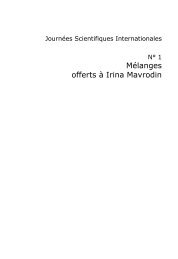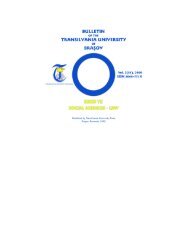„ovidius†constanţa - Biblioteca Universitatii "LUCIAN BLAGA" SIBIU
„ovidius†constanţa - Biblioteca Universitatii "LUCIAN BLAGA" SIBIU
„ovidius†constanţa - Biblioteca Universitatii "LUCIAN BLAGA" SIBIU
You also want an ePaper? Increase the reach of your titles
YUMPU automatically turns print PDFs into web optimized ePapers that Google loves.
Analele Universităţii „OVIDIUS” – Seria Istorie<br />
Volumul 4, 2007<br />
NATO, TERORISMUL CONTEMPORAN ŞI SECURITATEA<br />
NAŢIONALĂ<br />
Drd. Marius-George COJOCARU �<br />
NATO, Contemporary Terrorism and National Security<br />
Abstract: The establishment of North Atlantic Alliance has determined a continuous<br />
fight to ensure the freedom and security of its members through political and military<br />
means during the Cold War. This fight, mainly directed towards Soviet Union, remained<br />
without target after its disappearance. Accordingly, NATO had to redirect the policy<br />
and to explain the activity taking into consideration the fact according to which the<br />
Warsaw Treaty was dissolved. The fall of former Yugoslavia justified in front of public<br />
opinion the actions of the Alliance that was transformed into a force for the<br />
maintenance of peace being(or not) under UNO mandate. A new transformation of<br />
NATO occurred after September 2001 when the main direction of the policy of North<br />
Atlantic Alliance became the fight against terrorism of any kind. Nowadays, a part of<br />
NATO member states (Spain, Turkey, Great Britain) confronts in various regions<br />
(where it doesn’t exist an ethnic congestion, there is at least a minority ethnic group)<br />
with claims related to independence as regards the majority ethnic group and which<br />
make themselves heard by means of terrorist acts. These acts represent instability<br />
sources that contribute together with economic- financial, political, military, social,<br />
cultural and environmental aspects.<br />
Keywords: instability, crisis, terrorism, security.<br />
De la momentul înfiinţării sale Alianţa Nord Atlantică a dus o luptă<br />
continuă pentru a asigura libertatea şi securitatea membrilor săi, prin mijloace<br />
politice şi militare, pe toată durata Războiului Rece. Această luptă, îndreptată<br />
mai ales împotriva Uniunii Sovietice, a rămas fără obiect după dispariţia acesteia.<br />
Aşadar, NATO a trebuit să-şi reorienteze politica, să-şi explice activitatea în<br />
condiţiile în care şi Tratatul de la Varşovia se dizolvase. Prăbuşirea fostei<br />
Iugoslavii a justificat în faţa opiniei publice acţiunile Alianţei care se<br />
transformase într-o forţă de menţinere a păcii aflată (sau nu) sub mandat ONU.<br />
O nouă transformare a NATO s-a produs după 11 septembrie 2001<br />
când principala direcţie a politicii Alianţei Nord Atlantice a devenit lupta<br />
împotriva terorismului de orice fel. Astăzi o parte a statelor membre NATO<br />
(Spania, Turcia, Marea Britanie) se confruntă în diverse regiuni, (acolo unde<br />
există dacă nu o aglomeraţie etnică o etnie minoritară) cu revendicări legate de<br />
independenţă faţă de etnia majoritară şi care, de cele mai multe ori, se fac auzite<br />
� Lect. Univ. Drd., Facultatea de Istorie şi Ştiinţe Politice, Constanţa.<br />
ISSN -1841-138X 37 © 2007 Ovidius University Press



